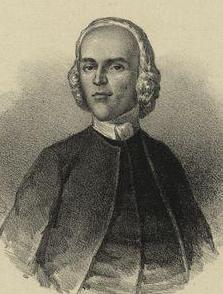Difference between revisions of "William Henry (1729)"
| Line 4: | Line 4: | ||
{{Infobox person | {{Infobox person | ||
| − | | image = | + | | image = WilliamHenry1729.jpg |
| name = William Henry | | name = William Henry | ||
| birth_date = {{birthdate|1729|5|19}}<ref>http://trees.ancestry.com/tree/1717034/person/-821256418</ref> | | birth_date = {{birthdate|1729|5|19}}<ref>http://trees.ancestry.com/tree/1717034/person/-821256418</ref> | ||
| Line 16: | Line 16: | ||
| relatives = | | relatives = | ||
}} | }} | ||
| + | |||
| + | Continental Congressman, Businessman, Inventor. He followed his father into gunsmithing and gun manufacturing. He was Justice of the Lancaster County Court of Common Pleas in 1770, 1773, and 1777. In 1771 he was appointed as a State Canal Commissioner, served in the State Assembly in 1776, and in 1777 he was appointed to the State Council of Safety. At the start of the Revolution he was commissioned Assistant Commissary General with the rank of Colonel. From 1777 to 1785 Henry was Lancaster County Treasurer and in 1780 he was appointed Presiding Judge of the Court of Common Pleas. From 1784 to 1785 he was a member of the Continental Congress. Henry was a skilled metal worker and machinist and invented the screw auger, a tool with threads, a sharp point and cutting edges used for boring holes in hard materials. Having learned of James Watt's invention of the steam engine, Henry made one and attempted to use it to propel a boat. He died before he could perfect this concept, but his work inspired others, including Robert Fulton. The Henry gun business produced the firearm known as the Pennsylvania or Kentucky rifle. The company continued into the 19th Century, producing weapons for the Revolution and the War of 1812, with Henry rifles used by settlers throughout the western United States because of their reliability and low cost. Henry was originally interred in Moravian Cemetery and later reburied in Greenwood. (bio by: Bill McKern)<ref>http://www.findagrave.com/cgi-bin/fg.cgi?page=gr&GSln=henry&GSfn=william&GSbyrel=in&GSdyrel=in&GSst=40&GScnty=2276&GScntry=4&GSob=n&GRid=19445946&df=all&</ref> | ||
| + | |||
==Notes== | ==Notes== | ||
{{Reflist}} | {{Reflist}} | ||
Revision as of 02:27, 17 November 2010
| This article needs additional genealogical research. One or more relatives can be traced. Please help improve this article by researching relatives. |
To do: Parents are traceable...
| William Henry | |
|---|---|
 | |
| Born |
May 19, 1729[1] Downingtown, Chester, Pennsylvania[2] |
| Died |
December 15, 1786 (aged 57)[3] Lancaster, Lancaster, Pennsylvania[4] |
| Resting place | Greenwood Cemetery, Lancaster, Pennsylvania, USA[5] |
| Spouse | Ann Woods (m. 1765) in Lancaster, Pennsylvania[6] |
| Children | George Henry (1760)[7] |
| Parents |
John Henry (1700 – 1747) Elizabeth De Vinney (1701 – 1778)[8] |
Continental Congressman, Businessman, Inventor. He followed his father into gunsmithing and gun manufacturing. He was Justice of the Lancaster County Court of Common Pleas in 1770, 1773, and 1777. In 1771 he was appointed as a State Canal Commissioner, served in the State Assembly in 1776, and in 1777 he was appointed to the State Council of Safety. At the start of the Revolution he was commissioned Assistant Commissary General with the rank of Colonel. From 1777 to 1785 Henry was Lancaster County Treasurer and in 1780 he was appointed Presiding Judge of the Court of Common Pleas. From 1784 to 1785 he was a member of the Continental Congress. Henry was a skilled metal worker and machinist and invented the screw auger, a tool with threads, a sharp point and cutting edges used for boring holes in hard materials. Having learned of James Watt's invention of the steam engine, Henry made one and attempted to use it to propel a boat. He died before he could perfect this concept, but his work inspired others, including Robert Fulton. The Henry gun business produced the firearm known as the Pennsylvania or Kentucky rifle. The company continued into the 19th Century, producing weapons for the Revolution and the War of 1812, with Henry rifles used by settlers throughout the western United States because of their reliability and low cost. Henry was originally interred in Moravian Cemetery and later reburied in Greenwood. (bio by: Bill McKern)[9]
Notes
- ↑ http://trees.ancestry.com/tree/1717034/person/-821256418
- ↑ http://trees.ancestry.com/tree/1717034/person/-821256418
- ↑ http://trees.ancestry.com/tree/1717034/person/-821256418
- ↑ http://trees.ancestry.com/tree/1717034/person/-821256418
- ↑ http://www.findagrave.com/cgi-bin/fg.cgi?page=gr&GSln=henry&GSfn=william&GSbyrel=in&GSdyrel=in&GSst=40&GScnty=2276&GScntry=4&GSob=n&GRid=19445946&df=all&
- ↑ http://trees.ancestry.com/tree/1717034/person/-821256418
- ↑ http://trees.ancestry.com/tree/1717034/person/-821256418
- ↑ http://trees.ancestry.com/tree/1717034/person/-821256418
- ↑ http://www.findagrave.com/cgi-bin/fg.cgi?page=gr&GSln=henry&GSfn=william&GSbyrel=in&GSdyrel=in&GSst=40&GScnty=2276&GScntry=4&GSob=n&GRid=19445946&df=all&